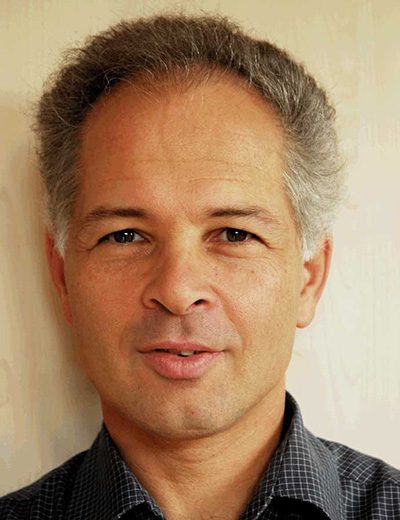Dr. U. Albrecht Group (Chronobiology)
Group leader
Dr. Urs Albrecht
Department of Biology, Unit of Biochemistry
Institution and Address
University of Fribourg, Chemin du Musée 5
Phone: +41 26 300 8636
e-mail: urs.albrecht@unifr.ch

Main goals
1. Understand the circadian clock system, in particular the specific functions of the clock genes Per1 and Per2.
2. Understand the relationship between the clock, mood disorders and feeding and how light and drugs affect these relationships.
3. Understand the influence of the circadian clock on nuclear receptors and the endocrine system.
Group members and their position
1 Research and Teaching assistant (J. Ripperger),
5 PhD students (A. Schnell, R. Chavan, K. Chojnowska, L. Mansencal, S. Fonseca),
1 Laboratory technician (60% A. Hayoz, 40% S. Baeriswyl),
1 Animal caretaker (60%)
Previous and current research
We discovered the mammalian homologues of the drosophila clock gene period (per). Genetically modified mice for these genes allowed us to show that Per1 and Per2 are components of the clock mechanism in mammals. Studying the effects of an altered clock on behavior, we found that the circadian clock is involved in the regulation of the reward system highlighting a role of the clock in mood regulation. Investiagiton of molecular interactions of clock components revealed that PER2 can act as a co-regulator of nuclear receptors linking the clock with the role of nuclear receptors in physiology.
Future projects
We aim to understand how the circadian clock system, which is at the crossroads to connect the external with the body internal world, is involved in the transmission of environmental information (e.g. light, food availability) to organs governing behavior.
Techniques / methods
Molecular biology and biochemistry techniques, in situ hybridization, cell culture, mouse behavior.
Equipment
– Wheel-running facility for mice
– VitalView system for measurement of general activity and body temperature in mice
– LumiCycle apparatus for real-time monitoring of circadian cycles in cells
– MultiElectrodeArray-System for measurement of electrical activity in live brain slices
– Quantitative PCR and molecular biology equipment
– Mouse facility
Selected publications
S. Chappuis, J.A. Ripperger, A. Schnell, G. Rando, C. Jud, W. Wahli, U. Albrecht. “Role of the circadian clock gene Per2 in adaptation to cold temperature”. Mol. Metab., 2: 184-193, 2013.
U. Albrecht. “Timing to perfection: The biology of central and peripheral circadian clocks”. Neuron, 74, 246-260, 2012.
I. Schmutz, J.A. Ripperger, S. Baeriswyl-Aebischer and U. Albrecht. “The mammalian clock component PERIOD2 coordinates circadian output by interaction with nuclear receptors”. Genes Dev., 24: 345-357, 2010.
G. Hampp, J. A. Ripperger, T. Houben, I. Schmutz, C. Blex, S. Perrau-Lenz, I. Brunk, R. Spanagel, G. Ahnert-Hilger, J. Meijer, U. Albrecht. “Regulation of the murine monoamine oxidase A gene by circadian clock components implies clock influence on mood”. Curr. Biol., 18, 678-683, 2008.
Selected lectures, seminars, colloquia
Lecturer “Biological Psychology II”, Lecture series for Bachelor Students, each Fall Term, University of Bern, Switzerland.
Instructor “Genetics and epigenetics in psychology”, course for Master Students, Spring Term 2013, University of Bern, Switzerland.
Funding
Swiss National Science Foundation
Velux Foundation
